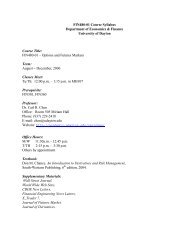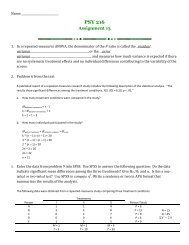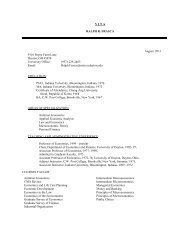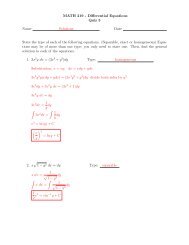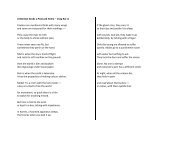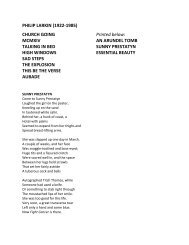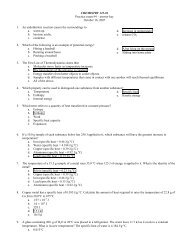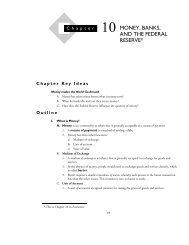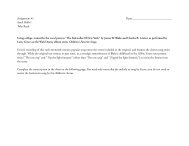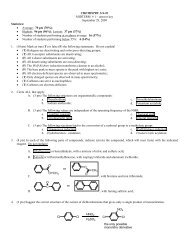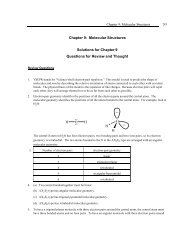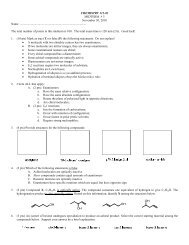flow mihaly csikszentmihalyi sami abuhamdeh jeanne nakamura
flow mihaly csikszentmihalyi sami abuhamdeh jeanne nakamura
flow mihaly csikszentmihalyi sami abuhamdeh jeanne nakamura
You also want an ePaper? Increase the reach of your titles
YUMPU automatically turns print PDFs into web optimized ePapers that Google loves.
FLOW<br />
MIHALY CSIKSZENTMIHALYI<br />
SAMI ABUHAMDEH<br />
JEANNE NAKAMURA<br />
A GENERAL CONTEXT<br />
FOR A CONCEPT<br />
OF MASTERY MOTIVATION<br />
What makes people want to go on with the effort<br />
required from life? Every epistemology of<br />
behavior must sooner or later cope with this<br />
basic question. The question is not so mysterious<br />
for nonhuman organisms, which presumably<br />
have built-in genetic programs instructing<br />
them to live as long as their physical<br />
machinery is able to function. But our species<br />
has a choice: With the development of consciousness,<br />
we have the ability to secondguess<br />
and occasionally override the instructions<br />
coded in our chromosomes. This evolutionary<br />
development has added a great deal of<br />
flexibility to the human repertoire of behaviors.<br />
But the freedom gained has its downside—too<br />
many possibilities can have a paralyzing<br />
effect on action (Schwartz, 2000).<br />
Among the options we are able to entertain is<br />
that of ending our lives; thus, as the existential<br />
philosophers remarked, the question of<br />
why one should not commit suicide is fundamental<br />
to the understanding of human life.<br />
In fact, most attempts at a general psychology<br />
also start with the assumption that<br />
human beings have a "need" or a "drive"<br />
for self-preservation, and that all other motivations,<br />
if not reducible to, are then at least<br />
based on such a need. For example<br />
Maslow's hierarchy assumes that survival<br />
takes precedence over all other considerations,<br />
and no other need becomes active<br />
until survival is reasonably assured.<br />
But where is this will to live located? Is it<br />
nothing but a variation of the survival instincts<br />
all living organisms share, chemically<br />
etched into our genes? The last try for a<br />
comprehensive human psychology, that of<br />
Sigmund Freud, posited Eros as the source<br />
of all behavior—a force akin to the elan vital<br />
of the French philosopher Henri Bergson<br />
(1931/1944) and to similar concepts of life<br />
energy proposed by a long list of thinkers<br />
going back to the beginnings of speculative<br />
thought.<br />
598
32. Flow 599<br />
Eros, which originally referred to the need<br />
of the organism to fulfill its physical potential,<br />
was soon reduced in Freud's writings,<br />
and even more so in those of his followers,<br />
to the libidinal pleasure that through natural<br />
selection has become attached to the sexual<br />
reproductive act and to the organs implicated<br />
in it. Thus, "erotic" eventually became<br />
synonymous with "sexual."<br />
This reduction of the concept of vitality to<br />
the reproductive function rested on a reasonably<br />
sound logic. The Darwinian revolution<br />
highlighted the role of sexual selection<br />
in evolution; thus, it made sense to see sexuality<br />
as the master-need from which all other<br />
interests and motives derive. A species survives<br />
as long as its members reproduce. If<br />
the drive to reproduce became well entrenched<br />
in a species, its survival would be<br />
enhanced. Following Ockham's principle of<br />
parsimony, one might expect that as long as<br />
sexual drives are well established, other motives<br />
become secondary. Whatever men and<br />
women do, from making songs to mapping<br />
the heavens, is just a disguised expression of<br />
Eros, a manifestation of the reproductive<br />
drive.<br />
On closer examination, however, this single<br />
causality seems much less convincing. A<br />
species needs to take care of many other priorities<br />
besides reproduction in order to survive.<br />
At the human stage of evolution, where<br />
adaptation and survival depend increasingly<br />
on flexible responses mediated by conscious<br />
thought, members of the species had to learn<br />
how to master and control a hostile and<br />
changing environment. It makes sense to assume<br />
that natural selection favored those individuals,<br />
and their descendants, who enjoyed<br />
acts of mastery and control—just as<br />
survival was enhanced when other acts necessary<br />
for survival, such as eating and sex,<br />
became experienced as pleasurable.<br />
The various behaviors associated with<br />
control and mastery—such as curiosity, interest,<br />
exploration; the pursuit of skills, the<br />
relishing of challenges—need not be seen as<br />
derivatives of thwarted libidinal sexuality.<br />
They are just as much a part of human nature,<br />
just as necessary for our survival, as the<br />
drive to reproduce. The ancients understood<br />
this when they coined the aphorism Libri<br />
aut Hberi: "Books or sons." As humans, we<br />
have the option of leaving a trace of our existence<br />
by writing books (or shaping tools,<br />
raising buildings, writing songs, etc.) and<br />
thus leaving a cultural legacy, as well as leaving<br />
our genes to our progeny. The two are<br />
not reducible to each other, but are equally<br />
important motives that have become ingrained<br />
in our natures.<br />
The idea that the ability to operate effectively<br />
in the environment fulfills a primary<br />
need is not new in psychology. In Germany,<br />
Karl Groos (1901) and Karl Buhler (1930)<br />
elaborated the concept of Funktionlust, or<br />
"activity pleasure," which Jean Piaget<br />
(1952) included in the earliest stages of<br />
sensorimotor development as the "pleasure<br />
of being a cause" that drove infants to experiment.<br />
In more recent psychological<br />
thought, Hebb (1955) and Berlyne (1960)<br />
focused on the nervous system's need for optimal<br />
levels of stimulation to explain exploratory<br />
behavior and the seeking of novelty,<br />
while White (1959) and deCharms (1968)<br />
focused on people's need to feel in control,<br />
to be the causal agents of their actions. Later<br />
Deci and Ryan (Deci, 1971; Deci & Ryan,<br />
1985) elaborated on this line of argument by<br />
suggesting that both competence and autonomy<br />
were innate psychological needs that<br />
must be satisfied for psychological growth<br />
and well-being.<br />
Theories that provide explanations for<br />
why people are motivated to master and<br />
control tend to be distal. In other words,<br />
they provide sensible explanations, typically<br />
based on an evolutionary framework, for<br />
why such behaviors should have become established<br />
over many generations, in order to<br />
support the reproductive success of the individual.<br />
However, for an activity pattern to<br />
become established in a species' repertoire, it<br />
has to be experienced as enjoyable by the individual.<br />
To explain how this happens, a<br />
proximal theory of motivation is needed.<br />
Such a theory must rely on at least four<br />
complementary lines of explanation. In the<br />
first place, it is likely that mastery-related<br />
behavior has become personally rewarding<br />
because it has evolved, through literally millions<br />
of years of trial and error, as an effective<br />
strategy to achieve other goals, such as<br />
mates and material resources. Overcoming<br />
challenges and excelling is therefore adaptive<br />
and increases chances for reproductive<br />
success.<br />
Second, one may adopt a more Freudian<br />
line and see mastery-related behavior as an
600 VI. SELF-REGULATORY PROCESSES<br />
internalized drive that could serve either the<br />
purposes of the id (in the case of tyrants or<br />
robber barons) or of the superego (in the<br />
case of creative, prosocial individuals). In<br />
this, as in the previous case, the behavior<br />
does not serve an independent function but<br />
is a disguised manifestation of other forces<br />
seeking their own aims.<br />
Third, the person may seek out such behaviors<br />
because of innate or learned psychological<br />
needs, such as competence and autonomy.<br />
According to this explanation, the<br />
enjoyment one experiences during intrinsically<br />
motivated behavior is largely a result of<br />
the satisfaction of these basic psychological<br />
needs.<br />
This chapter deals with a fourth kind of<br />
explanation, which we call the "phenomenological<br />
account." It tries to look very<br />
closely at what people actually experience<br />
when they are involved in activities that involve<br />
mastery, control, and autonomous<br />
behavior, without prejudging the reasons for<br />
why such experiences exist. This line of explanation<br />
assumes that the human organism<br />
is a system in its own right, not reducible to<br />
lower levels of complexity, such as stimulusresponse<br />
pathways, unconscious processes,<br />
or neurological structures.<br />
These four kinds of explanations are not<br />
incompatible with each other. In fact, they<br />
are likely to be all implicated in the genesis<br />
and maintenance of mastery behavior at the<br />
individual level. Quite often, they support<br />
each other, driving the organism in the same<br />
direction. But it is also often the case that<br />
the genetically programmed instructions<br />
may come into conflict with the learned<br />
ones, or that the unconscious forces press in<br />
a direction contrary to what the phenomenological<br />
reality suggests.<br />
THE NATURE OF FLOW<br />
The fourth of these lines of explanation, focused<br />
on events occurring in the consciousness<br />
of the individual, is the one here identified<br />
with the study of the <strong>flow</strong> experience.<br />
This experience emerged over a quarter-century<br />
ago as a result of a series of studies of<br />
what were initially called autotelic activities;<br />
that is, things people seem to do for the activity's<br />
own sake.<br />
Why do people perform time-consuming,<br />
difficult, and often dangerous activities for<br />
which they receive no discernible extrinsic<br />
rewards? This was the question that originally<br />
prompted one of us into a program of<br />
research that involved extensive interviews<br />
with hundreds of rock climbers, chess players,<br />
athletes, and artists (Csikszent<strong>mihaly</strong>i,<br />
1975; Nakamura & Csikszent<strong>mihaly</strong>i,<br />
2002). The basic conclusion was that, in all<br />
the various groups studied, the respondents<br />
reported a very similar subjective experience<br />
that they enjoyed so much that they were<br />
willing to go to great lengths to experience it<br />
again. This we eventually called the "<strong>flow</strong><br />
experience," because in describing how it<br />
felt when the activity was going well, several<br />
respondents used the metaphor of a current<br />
that carried them along effortlessly.<br />
Flow is a subjective state that people report<br />
when they are completely involved in<br />
something to the point of forgetting time, fatigue,<br />
and everything else but the activity itself.<br />
It is what we feel when we read a wellcrafted<br />
novel or play a good game of squash,<br />
or take part in a stimulating conversation.<br />
The defining feature of <strong>flow</strong> is intense experiential<br />
involvement in moment-to-moment<br />
activity. Attention is fully invested in the<br />
task at hand, and the person functions at his<br />
or her fullest capacity. Mark Strand, former<br />
Poet Laureate of the United States, in one of<br />
our interviews, described this state while<br />
writing as follows:<br />
You're right in the work, you lose your sense<br />
of time, you're completely enraptured, you're<br />
completely caught up in what you are doing.<br />
. . . When you are working on something and<br />
you are working well, you have the feeling that<br />
there's no other way of saying what you're saying,<br />
(in Csikszent<strong>mihaly</strong>i, 1996, p. 121)<br />
The intense experiential involvement of<br />
<strong>flow</strong> is responsible for three additional subjective<br />
characteristics commonly reported:<br />
the merging of action and awareness, a sense<br />
of control, and an altered sense of time.<br />
The Merging of Action and Awareness<br />
The default option of consciousness is a chaotic<br />
review of things that one fears or desires,<br />
resulting in a phenomenological state<br />
we have elsewhere labeled "psychic entropy"<br />
(Csikszent<strong>mihaly</strong>i & Csikszent<strong>mihaly</strong>i,
32. Flow 601<br />
1988). During <strong>flow</strong>, however, attentional resources<br />
are fully invested in the task at hand,<br />
so that objects beyond the immediate interaction<br />
generally fail to enter awareness.<br />
One such object is the self. Respondents<br />
frequently describe a loss of self-consciousness<br />
during <strong>flow</strong>. Without the required<br />
attentional resources, the self-reflective processes<br />
that often intrude into awareness and<br />
cause attention to be diverted from what<br />
needs to be done are silenced, and the usual<br />
dualism between actor and action disappears.<br />
In the terms that George Herbert<br />
Mead introduced (1934/1970), the "me"<br />
disappears during <strong>flow</strong>, and the "I" takes<br />
over. A rock climber in an early study of<br />
<strong>flow</strong> put it this way:<br />
You're so involved in what you're doing you<br />
aren't thinking about yourself as separate from<br />
the immediate activity. You're no longer a participant<br />
observer, only a participant. You're<br />
moving in harmony with something else you're<br />
part of. (in Csikszent<strong>mihaly</strong>i, 1975, p. 86)<br />
A Sense of Control<br />
During <strong>flow</strong>, we typically experience a sense<br />
of control—or, more precisely, a lack of anxiety<br />
about losing control that is typical of<br />
many situations in normal life. This sense of<br />
control is also reported in activities that involve<br />
serious risks, such as hang gliding,<br />
rock climbing, and race car driving—activities<br />
that to an outsider would seem to be<br />
much more potentially dangerous than the<br />
affairs of everyday life. Yet these activities<br />
are structured to provide the participant<br />
with the means to reduce the margin of error<br />
to as close to zero as possible. Rock climbers,<br />
for example, insist that their hair-raising<br />
exploits are safer than crossing a busy street<br />
in Chicago, because, on the rock face, they<br />
can foresee every eventuality, whereas when<br />
crossing the street, they are at the mercy of<br />
fate. The sense of control respondents describe<br />
thus reflects the possibility, rather<br />
than the actuality, of control.<br />
Worrying about whether we can succeed<br />
at what we are doing—on the job, in relationships,<br />
even in crossing a busy street—is<br />
one of the major sources of psychic entropy<br />
in everyday life, and its reduction during<br />
<strong>flow</strong> is one of the reasons such an experience<br />
becomes enjoyable and thus rewarding.<br />
Altered Sense of Time<br />
William James (1890, Ch. 15, Sec. 4) noted<br />
that boredom seems to increase when "we<br />
grow attentive to the passage of time itself."<br />
During <strong>flow</strong>, attention is so fully invested in<br />
moment-to-moment activity that there is little<br />
left over to devote toward the mental<br />
processes that contribute to the experience<br />
of duration (Friedman, 1990). As a result,<br />
persons deeply immersed in an activity typically<br />
report time passing quickly (Conti,<br />
2001).<br />
Exceptions occur in certain sports or jobs<br />
that require precise knowledge of time, but<br />
these are exceptions that prove the rule: Basketball<br />
players must learn not to dribble the<br />
ball in their own side of the court for more<br />
than 10 seconds; football players must learn<br />
to "manage the clock" in a close game.<br />
Awareness of time in these situations is not<br />
extraneous information signifying boredom,<br />
but a challenge that the person has to overcome<br />
in order to perform well.<br />
THE CONDITIONS OF FLOW<br />
Flow experiences are relatively rare in everyday<br />
life, but almost everything—work, study<br />
or religious ritual—is able to produce them,<br />
provided certain conditions are met. Past research<br />
suggests three conditions of key importance.<br />
First, <strong>flow</strong> tends to occur when the<br />
activity one engages in contains a clear set of<br />
goals. These goals serve to add direction and<br />
purpose to behavior. Their value lies in their<br />
capacity to structure experience by channeling<br />
attention rather than being ends in themselves.<br />
A second precondition for <strong>flow</strong> is a balance<br />
between perceived challenges and perceived<br />
skills. This condition is reminiscent of<br />
the concept of "optimal arousal" (Berlyne,<br />
1960; Hunt, 1965), but differs from it in<br />
highlighting the fact that what counts at the<br />
phenomenological level is the perception of<br />
the demands and abilities, not necessarily<br />
their objective presence.<br />
When perceived challenges and skills are<br />
well matched, as in a close game of tennis or<br />
a satisfying musical performance, attention<br />
is completely absorbed. This balance, however,<br />
is intrinsically fragile. If challenges begin<br />
to exceed skills, one typically becomes
602 VI. SELF-REGULATORY PROCESSES<br />
anxious; if skills begin to exceed challenges,<br />
one relaxes and then becomes bored. These<br />
subjective states provide feedback about the<br />
shifting relationship to the environment and<br />
press the individual to adjust behavior in order<br />
to escape the more aversive subjective<br />
state and reenter <strong>flow</strong>.<br />
Finally, <strong>flow</strong> is dependent on the presence<br />
of clear and immediate feedback. The individual<br />
needs to negotiate the continually<br />
changing environmental demands that are<br />
part of all experientially involving activity<br />
(Reser & Scherl, 1988). Immediate feedback<br />
serves this purpose: It informs the individual<br />
how well he or she is progressing in the activity,<br />
and dictates whether to adjust or<br />
maintain the present course of action. It<br />
leaves the individual with little doubt about<br />
what to do next.<br />
Because <strong>flow</strong> takes place at a high level of<br />
challenge, the feedback one receives during<br />
the course of an activity will inevitably<br />
include "negative" performance feedback.<br />
From a phenomenological viewpoint, this<br />
negative feedback will not necessarily be<br />
detrimental to task involvement. Provided<br />
the individual perceives that he or she possesses<br />
the skills to take on the challenges of<br />
the activity, the valence of the feedback is of<br />
less consequence for activity enjoyment than<br />
the usefulness of the feedback in suggesting<br />
appropriate corrective measures. Indeed, it is<br />
not difficult to think of situations in which<br />
we intentionally elicit negative feedback in<br />
order to direct attention and behavior (e.g.,<br />
a pianist practicing with a metronome).<br />
To summarize, clear goals, optimal challenges,<br />
and clear, immediate feedback are all<br />
necessary features of activities that promote<br />
the intrinsically rewarding experiential involvement<br />
that characterizes <strong>flow</strong>. Of<br />
course, this is not to say that these are the<br />
only factors that affect the degree to which<br />
one becomes involved in an activity. Research<br />
on task involvement suggests that the<br />
importance an individual places on doing<br />
well in an activity (i.e., "competence valuation")<br />
predicts the individual's involvement<br />
in that activity (Greenwald, 1982;<br />
Harackiewicz & Elliot, 1998; Harackiewicz<br />
& Manderlink, 1984), as does the congruence<br />
between task-specific, behaviorally<br />
based goals (e.g., "I want to attach a flag to<br />
my car's antenna") and higher level, more<br />
abstract goals (e.g., "I want to show my patriotism"),<br />
with greater congruence leading<br />
to greater involvement (Harackiewicz &<br />
Elliot, 1998; Rathunde, 1989; Sansone,<br />
Sachau, & Weir, 1989). Furthermore, the<br />
personal implications an individual attributes<br />
to success or failure at an activity can<br />
affect his or her interpretation of performance<br />
feedback, which in turn has consequences<br />
for task involvement (Mueller &<br />
Dweck, 1998). With respect to individual<br />
differences, Wong (2000) found that autonomy<br />
orientation (Deci & Ryan, 1985) was<br />
positively related to involvement in schoolrelated<br />
activities; absorption (Tellegen &<br />
Atkinson, 1974), a trait construct used to<br />
measure hypnotic susceptibility, and conceptually<br />
related to openness to experience, has<br />
been shown to be positively associated with<br />
experiential involvement (Glisky, Tataryn,<br />
Tobias, Kihlstrom, & McConkey, 1991;<br />
Levin & Fireman, 2001; Wild, Kuiken, &<br />
Schopflocher, 1995).<br />
FLOW AND MOTIVATION<br />
Theories of motivation generally neglect the<br />
phenomenology of the person to whom motivation<br />
is being attributed. They explain the<br />
reason for action in functional terms, that is,<br />
by considering outcomes rather than processes<br />
(Sansone & Harackiewicz, 1996).<br />
How the person feels while acting tends to<br />
be ignored. Yet individuals constantly evaluate<br />
their quality of experience and often will<br />
decide to continue or terminate a given<br />
behavioral sequence based on their evaluations.<br />
Our research suggests that the phenomenological<br />
experience of <strong>flow</strong> is a powerful<br />
motivating force. When individuals are<br />
fully involved in an activity, they tend to find<br />
the activity enjoyable and intrinsically rewarding.<br />
Whatever the original motivation<br />
for playing chess or playing the stock market,<br />
or going out with a friend, such activities<br />
will not continue unless they are enjoyable—or<br />
unless people are motivated by<br />
extrinsic rewards.<br />
Flow and Competence Motivation<br />
Perceived competence has traditionally<br />
played a central part in theories of motivation<br />
(Bandura, 1982; Deci, 1975; Harter,<br />
1978; White, 1959). These theories gener-
32. Flow 603<br />
ally argue that intrinsic motivation is promoted<br />
by feelings of competence and efficacy.<br />
In support of this, several researchers<br />
have found that positive competence feedback<br />
is positively related to subsequent<br />
motivation to perform an activity (Deci,<br />
1971; Elliot et al., 2000; Fisher, 1978;<br />
Harackiewicz, 1979; Ryan, 1982; Vallerand<br />
& Reid, 1984).<br />
These findings are consistent with past research<br />
on <strong>flow</strong>. Our studies have found that<br />
actors who perceive that they lack the skills<br />
to take on effectively the challenges presented<br />
by the activity in which they are participating<br />
experience anxiety or boredom,<br />
depending on how much they value doing<br />
well in the activity (Csikszent<strong>mihaly</strong>i &<br />
LeFevre, 1989; Csikszent<strong>mihaly</strong>i & Nakamura,<br />
1989; Csikszent<strong>mihaly</strong>i, Rathunde, &<br />
Whalen, 1993). Simply put, if an actor feels<br />
incompetent in a given situation, he or she<br />
will tend not be motivated. However, our research<br />
also suggests that although perceived<br />
competence seems to be an important precondition<br />
for intrinsic motivation, it is often<br />
not a predominating characteristic of<br />
the phenomenological experience associated<br />
with intrinsically motivated behavior. More<br />
specifically, much of the reward of intrinsically<br />
motivated behavior is derived from the<br />
experience of absorption and interest, the<br />
epitome of which is <strong>flow</strong>.<br />
Consider the following example: A person<br />
picks up a novel to read. As she begins reading<br />
it, she senses that her abilities are not up<br />
to the task, that the material is too complex<br />
for her to appreciate fully. Feeling unable to<br />
take on the challenges of the book because<br />
her skills are lacking, she will experience<br />
anxiety or boredom, and will probably opt<br />
for a less demanding novel or activity. However,<br />
if she feels that the complexities of the<br />
book are within her capacities and is able to<br />
digest the material, her decision either to<br />
continue reading the novel or to put it down<br />
will be based primarily on her quality of experience<br />
while reading the book, namely, the<br />
extent to which she finds the book involving<br />
and interesting.<br />
Emergent Motivation<br />
The phenomenology of <strong>flow</strong> further suggests<br />
that we may enjoy a particular activity because<br />
of something discovered through the<br />
interaction. It is commonly reported, for instance,<br />
that a person is at first indifferent or<br />
bored by a certain activity, such as listening<br />
to classical music or using a computer. Then,<br />
when the opportunities for action become<br />
clearer or the individual's skills improve, the<br />
activity begins to be interesting and, finally,<br />
enjoyable. It is in this sense that the rewards<br />
of these types of intrinsically motivating activities<br />
are "emergent" or a priori unpredictable.<br />
The phenomenon of emergent motivation<br />
means that we can come to experience a new<br />
or previously unengaging activity as intrinsically<br />
rewarding, if we find <strong>flow</strong> in it. The<br />
motivation to persist in or return to the activity<br />
arises out of the experience itself.<br />
What happens next is responsive to what<br />
happened immediately before, within the<br />
interaction, rather than being dictated by a<br />
preexisting intentional structure located<br />
within either the person (e.g., a goal or<br />
drive) or the environment (e.g., a tradition,<br />
script, or set of rules). The <strong>flow</strong> experience is<br />
thus a force for expansion in relation to the<br />
individual's goal and interest structure, as<br />
well as for the growth of skills in relation to<br />
an existing interest (Csikszent<strong>mihaly</strong>i &<br />
Nakamura, 1999).<br />
Certain technologies become successful at<br />
least in part because they provide <strong>flow</strong>, thus<br />
motivating people to use them. A good example<br />
is the Internet, developed with funds<br />
made available by the U.S. Department of<br />
Defense for purposes of national security.<br />
This technology has been adapted to all<br />
sorts of unexpected uses and has made possible<br />
an enormous variety of unpredicted experiences.<br />
It partly accounts, for instance,<br />
for the spectacular success of the Linux open<br />
system software, where tens of thousands of<br />
amateur and professional programmers<br />
work hard to come up with new software<br />
for the sheer delight of solving a problem,<br />
and for being appreciated by respected<br />
peers. In the process, Linux has been making<br />
headway against much more formidable<br />
competitors, such as Microsoft, who have to<br />
pay their programmers to write software—a<br />
clear example of emergent intrinsic rewards<br />
actually trumping extrinsic rewards.<br />
In summary, quality of experience is the<br />
proximal cause of intrinsically motivated<br />
behavior. When an individual begins, continues,<br />
or ends an activity that is not motivated
604 VI. SELF-REGULATORY PROCESSES<br />
by extrinsic rewards, such decisions are<br />
based primarily on the current or anticipated<br />
enjoyment accompanying the activity.<br />
In this context, both motivation and goals<br />
are emergent, in the sense that they are determined<br />
by the actor's moment-to-moment<br />
experience.<br />
Is deep experiential involvement a prerequisite<br />
for intrinsically motivated behavior?<br />
Clearly, it is not. As past research on the<br />
structure of affect has demonstrated, positive<br />
affect can be in the form of both highand<br />
low-activation positive affect (Tellegen,<br />
Watson, & Clark, 1999). Whereas <strong>flow</strong> represents<br />
a state of high-activation positive affect,<br />
it contrasts sharply with low-activation<br />
positive affect, which is associated with<br />
states such as relaxation and contentment. It<br />
is consistent with current understandings of<br />
evolution to suppose that both of these strategies<br />
for coping with the environment, one<br />
conservative and the other expansive, were<br />
selected over time as important components<br />
of the human behavioral repertoire, even<br />
though they motivate different—in some<br />
sense, opposite—behaviors. Yet because it is<br />
only during states of high activation that we<br />
are pushed to expand our existing capacities,<br />
<strong>flow</strong> is particularly important to understand<br />
given the implications it has for personal<br />
growth.<br />
FLOW AND<br />
COMPETENCE-RELEVANT OUTCOMES<br />
High levels of both mental and physical performance<br />
usually depend on goal-directed<br />
attention produced by specific challenges<br />
and clear feedback (Locke, Shaw, Saari, &<br />
Latham, 1981). It is therefore not surprising<br />
that a host of studies have found a strong<br />
positive relationship between <strong>flow</strong> and performance.<br />
For example, <strong>flow</strong> is positively associated<br />
with artistic and scientific creativity<br />
(e.g., Perry, 1999; Sawyer, 1992), effective<br />
teaching (Csikszent<strong>mihaly</strong>i, 1996), learning<br />
(Csikszent<strong>mihaly</strong>i et al., 1993), and peak<br />
performance in sports (Jackson, Thomas,<br />
Marsh, & Smethurst, 2002; Stein, Kimiecik,<br />
Daniels, & Jackson, 1995).<br />
Perhaps more compelling than situationally<br />
based positive outcomes, however, are<br />
the developmental implications of the <strong>flow</strong><br />
model. As individuals master challenges in<br />
an activity, they develop greater levels of<br />
skill, and the activity ceases to be as involving<br />
as before. To continue experiencing<br />
<strong>flow</strong>, they must identify increasingly greater<br />
challenges. Thus, over time, the balance between<br />
challenges and skills enhances competence.<br />
Experiential goals thus introduce a<br />
principle of selection into psychological<br />
functioning that fosters growth and<br />
stretches a person's existing capacities (cf.<br />
Vygotsky, 1978).<br />
This positive relationship between <strong>flow</strong><br />
and skill development has been demonstrated<br />
in a number of studies that have used<br />
the experience sampling method (Csikszent<strong>mihaly</strong>i<br />
& Larson, 1984) to examine the<br />
phenomenological experience of students<br />
within school settings. In longitudinal research<br />
with talented adolescents, students<br />
still committed to pursuing their talent area<br />
at age 17 were compared to peers who had<br />
already disengaged. Four years earlier, those<br />
who were still committed had experienced<br />
more <strong>flow</strong> and less anxiety than their peers<br />
while engaged in school-related activities;<br />
they were also more likely to have identified<br />
their talent area as a source of <strong>flow</strong><br />
(Csikszent<strong>mihaly</strong>i et al., 1993). In a longitudinal<br />
study of students talented in mathematics,<br />
Heine (1996) showed that those who<br />
experienced <strong>flow</strong> in the first part of the<br />
course performed better in the second half,<br />
controlling for their initial abilities and<br />
grade point average (GPA). Also controlling<br />
for initial abilities, Wong and Csikszent<strong>mihaly</strong>i<br />
(1991) found that immediate, experiencebased<br />
motivation was a better predictor of<br />
the difficulty level of classes that students<br />
subsequently chose than their motivation to<br />
achieve long-term academic goals.<br />
Longitudinal research on resilience suggests<br />
that, in addition to enhancing positive<br />
outcomes, a subjectively optimal matching<br />
of challenge and skill in daily life may protect<br />
against negative outcomes (Schmidt,<br />
1999). In a national sample of American adolescents,<br />
teenagers who had experienced<br />
high adversity at home and/or at school but<br />
had access to extracurricular and other challenging<br />
activities, and who were involved in<br />
these activities and felt successful when engaged<br />
in them, were much less likely to have<br />
problems years later.
32. Flow 605<br />
FLOW AND SPECIES-LEVEL<br />
DEVELOPMENT<br />
Flow and the Evolution of Consciousness<br />
Consciousness is the complex system that<br />
has evolved in humans for selecting, processing,<br />
and storing the profusion of information<br />
provided by the senses. Consciousness<br />
gives us a measure of control, freeing us<br />
from complete subservience to the dictates<br />
of genes and culture, by representing alternative<br />
courses of action in awareness,<br />
thereby introducing the alternative of rejecting<br />
rather than enacting them. It thus serves<br />
as a clutch between programmed instructions<br />
and adaptive behaviors (Csikszent<strong>mihaly</strong>i<br />
& Csikszent<strong>mihaly</strong>i, 1988). Alongside the<br />
genetic and cultural guides to action, it establishes<br />
a teleonomy of the self, a set of<br />
goals that have been freely chosen by the individual<br />
(cf. Brandstadter, 1998; Csikszent<strong>mihaly</strong>i<br />
& Massimini, 1985; Deci & Ryan,<br />
1985). It might, of course, prove dangerous<br />
to disengage our behavior from direct control<br />
by the genetic and cultural instructions<br />
that have evolved over millennia of adapting<br />
to the environment. On the other hand, doing<br />
so may increase the chances for adaptive<br />
fit with the present environment, particularly<br />
under conditions of radical or rapid<br />
change.<br />
In order for consciousness to be used for<br />
such positive ends, however, a person must<br />
learn to enjoy being conscious. People value<br />
in principle but seldom resort to free choice,<br />
reflection, and the weighing of alternatives.<br />
As Dostoevsky eloquently described in his<br />
tale of the Grand Inquisitor, it is much easier<br />
to act in terms of habit and convention, relying<br />
on genetic and cultural programs, than<br />
to decide in terms of one's own experience.<br />
This is in part due to the fact that the skills<br />
for being conscious need to be cultivated, or<br />
the task will seem too daunting and thus<br />
produce anxiety.<br />
Our schools are geared to teach cognitive<br />
skills, but these do not necessarily develop<br />
the skill for being conscious. A young person<br />
needs to exercise freedom in the allocation<br />
of attention, the pursuit of interests,<br />
and the mastering of challenges; only then<br />
will he or she begin to enjoy being conscious.<br />
This opportunity is rarely present in<br />
the normal school environment—or even<br />
earlier, in the family environment of the<br />
young child. But unless we learn to enjoy using<br />
the mind freely, yet in an orderly fashion,<br />
the evolution of consciousness is going to be<br />
hampered.<br />
Flow and the Evolution of Culture<br />
Flow is not only an important mechanism in<br />
the development of the person, but it also<br />
plays an important role in the development<br />
of culture. As we mentioned earlier in discussing<br />
the successful spread of the Linux<br />
open software system, new technologies, beliefs,<br />
lifestyles—and even political systems—<br />
are often adopted or rejected on the basis of<br />
whether they enhance or diminish the probability<br />
of producing <strong>flow</strong>.<br />
Professor Fausto Massimini of the University<br />
of Milan was the first scholar to realize<br />
the potential of <strong>flow</strong> to explain the selection<br />
of new cultural artifacts, or "memes"<br />
(Csikszent<strong>mihaly</strong>i & Massimini, 1985;<br />
Inghilleri, 1999; Massimini, Csikszent<strong>mihaly</strong>i,<br />
& Delle Fave, 1988). Essentially, the likelihood<br />
that a new idea, product, or process<br />
will survive over time is a function of the attention<br />
it attracts. A song, a scientific theory,<br />
or a religious system will be remembered<br />
and transmitted to the next generation only<br />
if some people pay attention to it. And people<br />
will pay attention in large part because<br />
the new meme provides an enjoyable challenge.<br />
This is clearly the case in the advancement<br />
of science. Thomas Kuhn (1970) describes<br />
how by focusing attention upon a small<br />
range of relatively esoteric problems, scientists<br />
are able to delve in greater depth and<br />
detail into their investigations, and thereby<br />
advance their field. Yet such focused attention<br />
cannot be sustained unless there are interesting<br />
problems that challenge the scientist.<br />
If there are none, the paradigm becomes<br />
boring, and the field disappears for lack of<br />
young recruits who are attracted to a different<br />
field by more interesting problems.<br />
The same holds true for art, according to<br />
Collingwood (1938) and Martindale (1990).<br />
More generally, any field of creative accomplishment<br />
requires concentrated attention,<br />
to the exclusion of all other stimuli, which<br />
temporarily become irrelevant (Csikszent<strong>mihaly</strong>i,<br />
1975; Getzels & Csikszent<strong>mihaly</strong>i,
606 VI. SELF-REGULATORY PROCESSES<br />
1976; Nakamura & Csikszent<strong>mihaly</strong>i, 2001).<br />
Yet one does not need to look at great accomplishments<br />
to realize this basic function<br />
of attention. More mundane work is just as<br />
dependent on it. In describing the workers<br />
that made industrialization possible at the<br />
dawn of capitalism, Max Weber (1930, p.<br />
71) commented on the relationship between<br />
puritanical religious beliefs and training on<br />
the one hand, and productivity on the other:<br />
"The ability of mental concentration ... is<br />
here most often combined with ... a cool<br />
self-control and frugality which enormously<br />
increase performance. This creates the most<br />
favorable foundation for the conception of<br />
labor as an end in itself."<br />
The late Roman Empire, the last decades<br />
of Byzantium, and the French court in the<br />
second half of the 18th century are only a<br />
few of the most notorious examples of what<br />
can happen when large segments of society<br />
fail to find enjoyment in productive life. To<br />
provide such experiences, the rulers of society<br />
had to resort to increasingly elaborate<br />
and expensive means of control and repression,<br />
or else artificial stimulations — circuses,<br />
chariot races, balls, and hunts — that drain<br />
the attention of a passive population without<br />
leaving any useful residue. Whenever a<br />
society is unable to provide <strong>flow</strong> experiences<br />
in productive activities, its members will<br />
find <strong>flow</strong> in activities that are either wasteful<br />
or actually disruptive.<br />
CONCLUSIONS<br />
The ability to enjoy challenges and then<br />
master them is a fundamental metaskill that<br />
is essential to individual development and to<br />
cultural evolution. Yet many obstacles prevent<br />
individuals from experiencing <strong>flow</strong>.<br />
These range from inherited genetic malfunctions<br />
to forms of social oppression that reduce<br />
personal freedom and prevent the acquisition<br />
of skills.<br />
But even in the most benign situations,<br />
<strong>flow</strong> may be difficult to attain. For instance,<br />
in our society at present, most parents are<br />
determined to provide the best conditions<br />
for their children's future happiness. They<br />
work hard, so that they can buy a nice home<br />
in the suburbs, get all the consumer goods<br />
they can afford, and send the children to the<br />
best schools possible. Unfortunately, none of<br />
this guarantees that the children will get<br />
what they need to learn in order to enjoy<br />
life. In fact, a growing number of studies<br />
suggests that excessive concern for safety,<br />
comfort, and material well-being is detrimental<br />
to optimal development (Csikszent<strong>mihaly</strong>i<br />
& Hunter, 2003; Kasser & Ryan,<br />
1993; Schmuck & Sheldon, 2001). The sterile<br />
surroundings of our living arrangements,<br />
the absence of working parents and other<br />
adults who could initiate young people into<br />
the joys of living, the addictive nature of<br />
passive entertainment and the reliance on<br />
material rewards, and the excessive concern<br />
of schools with testing and with disembodied<br />
knowledge all militate against learning<br />
to enjoy mastering the challenges that life inevitably<br />
presents.<br />
Thus, understanding how <strong>flow</strong> works is<br />
essential for social scientists interested in improving<br />
the quality of life at either the subjective<br />
or objective level. Transforming this<br />
knowledge into effective action is not easy.<br />
But the challenges this presents promise almost<br />
infinite opportunities for enjoyment to<br />
those who are willing to develop the skills<br />
necessary to master them.<br />
REFERENCES<br />
Bandura, A. (1982). Self-efficacy mechanism in human<br />
agency. American Psychologist, 37, 122-147.<br />
Bergson, H. (1944). Creative evolution. New York: The<br />
Modern Library. (Original published in 1931)<br />
Berlyne, D. (1960). Conflict, arousal, and curiosity.<br />
New York: McGraw-Hill.<br />
Brandstadter, J. (1998). Action perspectives in human<br />
development. In R. M. Lerner (Ed.), Handbook of<br />
child psychology (Vol. 1, pp. 807-863). New York:<br />
Wiley.<br />
Biihler, C. (1930). Die geistige Entwicklung des Kindes<br />
[The mental development of children]. Jena, Germany:<br />
G. Fischer.<br />
Collingwood, R. G. (1938). The principles of art. Oxford,<br />
UK: Oxford University Press.<br />
Conti, R. (2001). Time flies: Investigating the connection<br />
between intrinsic motivation and the experience<br />
of time. Journal of Personality, 69(1), 1-26.<br />
Csikszent<strong>mihaly</strong>i, M. (1975). Beyond boredom and<br />
anxiety. San Francisco: Jossey-Bass.<br />
Csikszent<strong>mihaly</strong>i, M. (1996). Creativity: Flow and the<br />
psychology of discovery and invention. New York:<br />
HarperCollins.<br />
Csikszent<strong>mihaly</strong>i, M., & Csikszent<strong>mihaly</strong>i, I. (Eds.).<br />
(1988). Optimal experience: Psychological studies of<br />
<strong>flow</strong> in consciousness. New York: Cambridge University<br />
Press.
32. Flow 607<br />
Csikszent<strong>mihaly</strong>i, M., & Hunter, J. (2003). Happiness<br />
in everyday life: The uses of experience sampling.<br />
Journal of Happiness Studies, 4(2), 1-15.<br />
Csikszent<strong>mihaly</strong>i, M., & Larson, R. (1984). Being adolescent.<br />
New York: Basic Books.<br />
Csikszent<strong>mihaly</strong>i, M., & LeFevre, J. (1989). Optimal<br />
experience in work and leisure. Journal of Personality<br />
and Social Psychology, 56(5), 815-822.<br />
Csikszent<strong>mihaly</strong>i, M., & Massimini, F. (1985). On the<br />
psychological selection of bio-cultural information.<br />
New Ideas in Psychology, 3(2), 115-138.<br />
Csikszent<strong>mihaly</strong>i, M., & Nakamura, J. (1989). The dynamics<br />
of intrinsic motivation: A study of adolescents.<br />
In R. Ames & C. Ames (Eds.), Research on<br />
motivation in education: Goals and cognitions (pp.<br />
45—71). New York: Academic Press.<br />
Csikszent<strong>mihaly</strong>i, M., & Nakamura, J. (1999).<br />
Emerging goals and the self-regulation of behavior.<br />
In R. S. Wyer (Ed.), Advances in social cognition:<br />
Vol. 12. Perspectives on behavioral self-regulation<br />
(pp. 107-118). Mahwah, NJ: Erlbaum.<br />
Csikszent<strong>mihaly</strong>i, M., Rathunde, K., & Whalen, S.<br />
(1993). Talented teenagers. Cambridge, UK: Cambridge<br />
University Press.<br />
deCharms, R. (1968). Personal causation. New York:<br />
Academic Press.<br />
Deci, E. (1971). Effects of externally mediated rewards<br />
on intrinsic motivation. Journal of Personality and<br />
Social Psychology, 18(1), 105-115.<br />
Deci, E. L. (1975). Intrinsic motivation. New York: Plenum<br />
Press.<br />
Deci, E., & Ryan, R. (1985). Intrinsic motivation and<br />
self-determination in human behavior. New York:<br />
Plenum Press.<br />
Elliot, A. J., Faler, J., McGregor, H. A., Campbell, W.<br />
K., Sedikides, C., & Harackiewicz, J. (2000). Competence<br />
valuation as a strategic intrinsic motivation<br />
process. Personality and Social Psychology Bulletin,<br />
26(7), 780-794.<br />
Elliot, A. J., & Harackiewicz, J. (1994). Goal setting,<br />
achievement orientation, and intrinsic motivation: A<br />
mediational analysis. Journal of Personality and Social<br />
Psychology, 66(5), 968-980.<br />
Fisher, C. D. (1978). The effects of personal control,<br />
competence, and extrinsic reward systems on intrinsic<br />
motivation. Organizational Behavior and Human<br />
Performance, 21, 273-288.<br />
Friedman, W. J. (1990). About time: Inventing the<br />
fourth dimension. Cambridge, MA: MIT Press.<br />
Getzels, J. W., & Csikszent<strong>mihaly</strong>i, M. (1976). The creative<br />
vision. New York: Wiley.<br />
Glisky, M. L., Tataryn, D. J., Tobias, B. A., Kihlstrom,<br />
J. E, & McConkey, K. M. (1991). Absorption, openness<br />
to experience, and hypnotizability. Journal of<br />
Personality and Social Psychology, 60(2), 263-272.<br />
Greenwald, A. (1982). Ego task analysis: An integration<br />
of research on ego-involvement and self-awareness.<br />
In A. H. Hastorf & A. M. Isen (Eds.), Cognitive<br />
social psychology (pp. 109-147). New York:<br />
Elsevier/North Holland.<br />
Groos, K. (1901). The play of man. New York:<br />
Appleton.<br />
Harackiewicz, J. M. (1979). The effects of reward contingency<br />
and performance feedback on intrinsic motivation.<br />
Journal of Personality and Social Psychology,<br />
37, 1352-1363.<br />
Harackiewicz, J. M., & Elliot, A. J. (1998). The joint<br />
effects of target and purpose goals on intrinsic motivation:<br />
A mediational analysis. Personality and Social<br />
Psychology Bulletin, 24(7), 675-689.<br />
Harackiewicz, J. M., & Manderlink, G. (1984). A process<br />
analysis of the effects of performance-contingent<br />
rewards on intrinsic motivation. Journal of Experimental<br />
Social Psychology, 20, 531-551.<br />
Harackiewicz, J. M., Sansone, C., & Manderlink, G.<br />
(1985). Competence, achievement orientation, and<br />
intrinsic motivation: A process analysis. Journal of<br />
Personality and Social Psychology, 48(2), 493-508.<br />
Harter, S. (1978). Effectance motivation reconsidered:<br />
Toward a developmental model. Human Development,<br />
2(1), 34-64.<br />
Hebb, D. O. (1955). Drive and the CNS. Psychological<br />
Review, 62, 243-252.<br />
Heine, C. (1996). Flow and achievement in mathematics.<br />
Unpublished doctoral dissertation, University of<br />
Chicago, Chicago, IL.<br />
Hunt, J. (1965). Intrinsic motivation and its role in development.<br />
In Nebraska Symposium on Motivation<br />
(Vol. 12, pp. 189-282). Lincoln: University of Nebraska<br />
Press.<br />
Inghilleri, P. (1999). From subjective experience to cultural<br />
change. Cambridge, UK: Cambridge University<br />
Press.<br />
Jackson, S. A., Thomas, P. R., Marsh, H. W., &<br />
Smethurst, C. J. (2002). Relationships between <strong>flow</strong>,<br />
self-concept, psychological skills, and performance.<br />
Journal of Applied Sport Psychology, 13(2), 129-153.<br />
James, W. (1890). The principles of psychology. New<br />
York: Holt.<br />
Kasser, T, & Ryan, R. (1993). A dark side of the American<br />
dream: Correlates of financial success as a central<br />
life aspiration. Journal of Personality and Social<br />
Psychology, 65, 410-422.<br />
Kuhn, T. S. (1970). The structure of scientific revolutions.<br />
Chicago: University of Chicago Press.<br />
Levin, R., & Fireman, G. (2001). The relation of fantasy<br />
proneness, psychological absorption, and imaginative<br />
involvement to nightmare prevalence and<br />
nightmare distress. Imagination, Cognition and Personality,<br />
21(2), 111-129.<br />
Locke, E. A., Shaw, K. N., Saari, L. M., & Latham, G.<br />
P. (1981). Goal setting and task performance: 1969-<br />
1980. Psychological Bulletin, 90(1), 125-152.<br />
Martindale, C. (1990). The clockwork muse: The predictability<br />
of artistic change. New York: Basic<br />
Books.<br />
Massimini, E, Csikszent<strong>mihaly</strong>i, M., & Delle Fave, A.<br />
D. (1988). Flow and biocultural evolution. In M.<br />
Csikszent<strong>mihaly</strong>i & I. S. Csikszent<strong>mihaly</strong>i (Eds.),<br />
Optimal experience: Psychological studies of <strong>flow</strong> in
608 VI. SELF-REGULATORY PROCESSES<br />
consciousness (pp. 60-81). New York: Cambridge<br />
University Press.<br />
Mead, G. H. (1970). Mind, self and society. Chicago:<br />
University of Chicago Press. (Original published in<br />
1934)<br />
Mueller, C. M., & Dweck, C. S. (1998). Praise for intelligence<br />
can undermine children's motivation and performance.<br />
Journal of Personality and Social Psychology,<br />
75, 33-52.<br />
Nakamura, J., & Csikszent<strong>mihaly</strong>i, M. (2001). Catalytic<br />
creativity: The case of Linus Pauling. American<br />
Psychologist, 56(4), 337-341.<br />
Nakamura, J., & Csikszent<strong>mihaly</strong>i, M. (2002). The<br />
concept of <strong>flow</strong>. In C. R. Snyder & S. J. Lopez (Eds.),<br />
Handbook of positive psychology (pp. 89-105).<br />
New York: Oxford University Press.<br />
Perry, S. K. (1999). Writing in <strong>flow</strong>. Cincinnati: Writer's<br />
Digest Books.<br />
Piaget, J. (1952). The origins of intelligence in children.<br />
New York: International Universities Press.<br />
Rathunde, K. (1989). The context of optimal experience:<br />
An exploratory model of the family. New Ideas<br />
in Psychology, 7(1), 91-97.<br />
Reset, J. P., & Scherl, L. M. (1988). Clear and unambiguous<br />
feedback: A transactional and motivational<br />
analysis of environmental challenge and self-encounter.<br />
Journal of Environmental Psychology, 8(4), 269-<br />
286.<br />
Ryan, R. M. (1982). Control and information in the<br />
intrapersonal sphere: An extension of cognitive evaluation<br />
theory. Journal of Personality and Social Psychology,<br />
43, 450-461.<br />
Sansone, C., & Harackiewicz, J. M. (1996). "I don't<br />
feel like it": The function of interest in self-regulation.<br />
In L. L. Martin & A. Tesser (Eds.), Striving and<br />
feeling: Interactions among goals, affect, and selfregulation<br />
(pp. 203-228). Mahwah, NJ: Erlbaum.<br />
Sansone, C., Sachau, D. A., & Weir, C. (1989). Effects<br />
of instruction on intrinsic interest: The importance<br />
of context. Journal of Personality and Social Psychology,<br />
57(5), 819-829.<br />
Sawyer, K. (1992). Improvisational creativity: An analysis<br />
of jazz performance. Creativity Research Journal,<br />
5(3), 253-263.<br />
Schmidt, J. A. (1999). Overcoming challenges: Exploring<br />
the role of action, experience, and opportunity<br />
in fostering resilience among adolescents. Dissertation<br />
Abstracts International: Section B: Sciences<br />
and Engineering, 59(11-B), 6095.<br />
Schmuck, P., 8c Sheldon, K. M. (Eds.). (2001). Life<br />
goals and well-being: Towards a positive psychology<br />
of human striving. Seattle: Hogrefe & Huber.<br />
Schwartz, B. (2000). Self-determination: The tyranny of<br />
freedom. American Psychologist, 55(1), 79-88.<br />
Stein, G. L., Kimiecik, J. C., Daniels, J., 8c Jackson, S.<br />
A. (1995). Psychological antecedents of <strong>flow</strong> in recreational<br />
sport. Personality and Social Psychology<br />
Bulletin, 21(2), 125-135.<br />
Tellegen, A., & Atkinson, G. (1974). Openness to absorbing<br />
and self-altering experiences ("absorption"),<br />
a trait related to hypnotic susceptibility. Journal of<br />
Abnormal Psychology, 83(3), 268-277.<br />
Tellegen, A., Watson, D., & Clark, L. A. (1999). On the<br />
dimensional and hierarchical structure of affect. Psychological<br />
Science, 10, 297-303.<br />
Vallerand, R. J., & Reid, G. (1984). On the causal effects<br />
of perceived competence on intrinsic motivation:<br />
A test of cognitive evaluation theory. Journal of<br />
Sport Psychology, 6(1), 94-102.<br />
Vygotsky, L. (1978). Mind in society. Cambridge, MA:<br />
Harvard University Press.<br />
Weber, M. J. (1930). The Protestant ethic and the spirit<br />
of capitalism. New York: Scribner.<br />
White, R. (1959). Motivation reconsidered: The concept<br />
of competence. Psychological Review, 66, 297-<br />
333.<br />
Wild, T. C., Kuiken, D., & Schopflocher, D. (1995).<br />
The role of absorption in experiential involvement.<br />
Journal of Personality and Social Psychology, 69(3),<br />
569-579.<br />
Wong, M. (2000). The relations among causality orientations,<br />
academic experience, academic performance,<br />
and academic commitment. Personality and<br />
Social Psychology Bulletin, 26(3), 315-326.<br />
Wong, M., & Csikszent<strong>mihaly</strong>i, M. (1991). Motivation<br />
and academic achievement: The effects of personality<br />
traits and the quality of experience. Journal of<br />
Personality, 59(3), 539-574.



